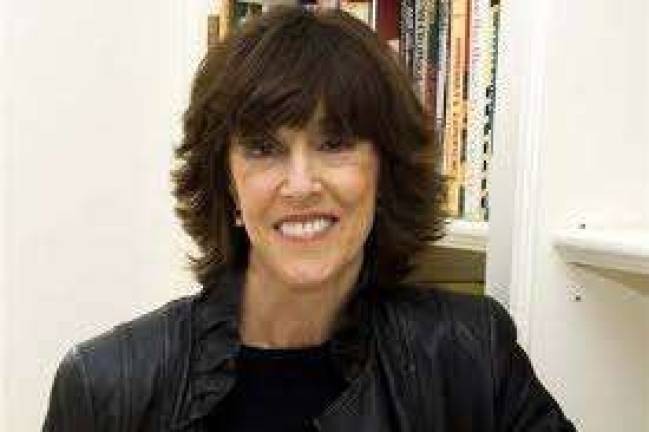Nora Ephron: In Memoriam

"Tell me I'll never have to be out there again." It's that line, delivered by Marie (Carrie Fisher) to Jess (Bruno Kirby), after learning that their mutual best friends Harry and Sally (yes, Billy Crystal and Meg Ryan) have switched up their friendship from platonic to "it's complicated," that makes Nora Ephron's screenplay for When Harry Met Sally a work for the ages. (Yes, even more than that orgasm scene in Katz's.) How a movie could be so light, so funny, so modern, could also manage to be so deftly universal and heart-piercing is the grand achievement of Ephron's quite checkered career. Very sadly, this career came to an end last night as Ephron lost a private battle with acute myeloid leukemia. But over the course of four decades, Ephron, an Upper West Side Jew raised in Hollywood by a team of play- and screenwriting parents, married the lightning-quick wit of Joan Rivers and the career ambition of Barbra Streisand in order to give birth to one of the most impressive ? and sure to be emulated ? lives a storyteller has ever enjoyed. Harry garnered Ephron a solo Oscar nomination, though she already had shared a nod with Alice Arlen for adapting Silkwood (her first outing with Meryl Streep) and would later share another nomination with Jeff Arch and David S. Ward for Sleepless in Seattle, her second at-bat as director and first monster hit. Though she came from a prominent background that opened many doors to her, Ephron's career history demonstrates an eager and talented employee who made sure to fill whatever room she was in, first as a mail at Newsweek and later as a writer for the New York Post, Esquire and New York (a magazine that would continue to extol and interview her as recently as this past year). Her attention to detail and human folly characterized her work, and it's those nuances permeating her work in all genres, both non-fiction and fictional, that elevated her humorous observations to something more prescient and evergreen. Working on an ultimately dismissed version of a script for All the President's Men with then-husband, Watergate journalist Carl Bernstein, helped open even more doors for the writer in Hollywood in the mid-1970s. (It was the second marriage for Ephron; a third, to GoodFellas co-writer Nicholas Pileggi lasted until her death.) Ephron was also, famously, willing to divulge her own personal hurts and humiliations, as she did in Heartburn, loosely translating her marriage to, betrayal by, and divorce from Bernstein. (The two had two sons together, Jacob and Max.) Streep and Jack Nicholson played the Ephron and Bernstein surrogates. The most celebrated directors and actors clamored to work with Ephron over the years ? Tom Hanks, Diane Keaton, Nicole Kidman, Mike Nichols, John Travolta. 2009's Julie & Julia also helped turn the page in Streep's own career, providing the opportunity to plum deep in a comedic but respectful look at chef Julia Child. Though her directorial debut, This Is My Life, showed some of the under-nourished signs of a fledgling director, it signaled one of Ephron's signature storytelling motifs that would continue through other films like Mixed Nuts, You've Got Mail, Bewitched: strong women. The dominant theme of the movies in which Ephron had a voice is that they feature women on equal emotional, professional, and romantic footing with their male counterparts. In Life, Dottie (Julie Kavner), is a single mother and struggling stand-up comic who suddenly finds success. Annie, the Ryan character in Sleepless, is a Baltimore journalist; Kathleen, the Ryan role in Mail, runs a family bookstore on the Upper West Side. She believes in the joy of reading and opposes the corporate monoliths out to destroy the charms of smaller stores. Though many (not all, however) of her female leads ended up with the guy, they remain defined by their own interests and experiences. The man need not complete her; he merely complements her. Ephron had, typically, showed few signs of slowing down. A Broadway production of Lucky Guy, a new play late columnist Mike McAlary, is targeted for a Broadway opening in early 2013 and would mark Hanks' Main Stem debut. But her crowning achievement will always be, for me, Harry, a film I have seen over two hundred times since it opened nearly 23 years ago. For all the classics like Casablanca and Gone With the Wind, and record-breaking moneymakers like Avatar and The Avengers, Harry is, by leaps and bounds, the single movie mentioned more than any other as a personal favorite in my conversations with people about movies they love. Why? Because of how Ephron tapped into its cross-generational appeal. She knew that a movie about love, insecurity, good food and real estate could reach just about anyone. Ephron's career and legacy are impressive enough to make even the most fulfilled and self-assured recite that other, oft-quoted line from Harry: "I'll have what she's having."